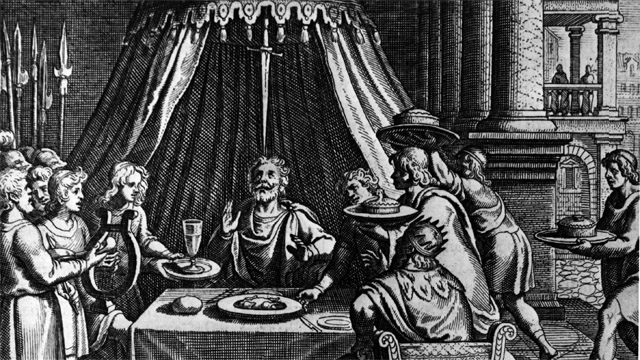A competence
As if you could
work without fear
of making mistakes
the “Paul, I’d like a word…”
work without worry
of targets not reached
the “Paul, are you happy here?”
work without the dole
and it’s keen edge
that hovers
above
your
head
because you are unimportant
easily replaceable
a bum on a seat
because you have to pay
for your home
for your insurances
for your illusion of steadiness
the “Paul, I’m sorry we’re going
to have to let you go.”

Marcus Tullius Cicero was a first-century BCE philosopher, politician, lawyer, and orator. He introduced the Romans to the chief schools of Greek philosophy and created a philosophical vocabulary (including numerous neologisms) that persisted for millennia, to such an extent that several humanist scholars insisted that no Latin word or phrase should be used unless it could be found in his works. His influence was so immense that the subsequent history of European prose up to the 19th century was said to be either a reaction against or a return to his style. His voluminous correspondence introduced the art of refined letter writing to European culture, and Francesco Petrarca's rediscovery of those letters in the 14th century provoked scholars to track down other scattered Greek and Latin texts, and the subsequent rediscovery of classical antiquity led to the Renaissance, on which his ideas became a major influence. His "De Officiis" was the second book printed in Europe, behind only the Bible. His philosophy strongly influenced political theorists such as John Locke, David Hume, and Edmund Burke.
ReplyDeleteHowever, except among classicists, Cicero's current legacy may be confined to his account of the sword of Damokles which appeared as the last example in the fifth volume ("Whether virtue alone be sufficient for a happy life") of the "Tusculanae Disputationes," a series of books he wrote at his villa in Tusculum ca. 45 BCE to popularize Stoic philosophy. Cicero may have gotten the parable from the "Bibliotheca historica" of his contemporary Diodoros Sikeliotes (Diodorus Siculus), whose universal history covered Egyptian, Mesopotamian, Indian, Greek, Scythian, North African, and European history from mythic times to about ca. BCE, the beginning of Gaius Iulius Caesar's Gallic wars. Or Cicero may have obtained it directly from a 40-volume history of Sicily written by Timaeus of Tauromenium (Taormina) in the 4th century BCE, though much of that work was already lost by the time Cicero wrote (though Cicero commended him for his copiousness of matter and variety of expression). Damokles ("fame of the people") was an obsequious courtier in the court of Dionysius II, the 4th-century BCE tyrant (whom Dante pictured as boiling in blood due to his violence against others) who ruled Syracuse from 367 to 357 BCE, when he was exiled, then seized power in Locri, returned to Syracuse in 346 BCE, and was exiled again in 344 BCE. Damokles conspicuously exclaimed that Dionysius was truly fortunate due to his power and wealth. When Dionysius offered to switch places with him, Damokles sat in his throne, only to discover that a huge sword was hanging over his head, held at the pommel by a single hair of a horse's tail. Damokles begged to return to his former condition, undertanding that fortune and power are accompanied by great danger. As Cicero moralized, "Does not Dionysius seem to have made it sufficiently clear that there can be nothing happy for the person over whom some fear always looms?" Despite Cicero's reputaion as a lawyer, author, and orator, he most prized his political career, which was marked by his opportunism. During his second consulship, in 63 BCE he suppressed Lucius Sergius Catilina's coup conspiracy by executing five suspects without trial, a move supported by Marcus Porcius Cato Uticensis but opposed by Caesar. In 60 BCE he declined Caesar's invitation to join him and Gnaeus Pompeius Magnus in governing the empire. Two years later he went into exile to avoid tril for his illegal actions of 63 BCE but returned to Roma in 57 BCE and devoted himself mainly to writing. By 50 BCE Caesar and Pompeius were openly at war; Cicero favoured Pompeius but avoided alienating Caesar until 49 BCE, when Caesar invaded Italy and Cicero joined Pompeius' forces at Pharslus, but Cato rebuked him, saying he would have been of more use to the cause of the optimates if he had stayed in Roma. After Caesar won the civil war in 48 BCE he pardoned Cicero but was assassinated two years later; one of the coup leaders, Marcus Junius Brutus, raised his bloody dagger and called on Cicero to restore the republic; he became the spokesman for the Senate and arranged to secure an amnesty for the assassins while maintaining Caesar's policies and reforms. When Casar's heir Octavianus returned to italy, Cicero encouraged him against the consul, Marcus Antonius, whom he publicly attacked. But Antonius and Octavianus reconciled and seized power, launching a pogrom against their enmies. Octavianus argued unsuccessfully for two days against adding Cicero to the list; he was caught on 7 December 43 BCE, slain, and beheaded; on Antonius' instructions, his hands were also cut off and publicly displayed with his head, and Antonius' wife pulled out his tongue and jabbed it repeatedly with her hairpin.
ReplyDelete